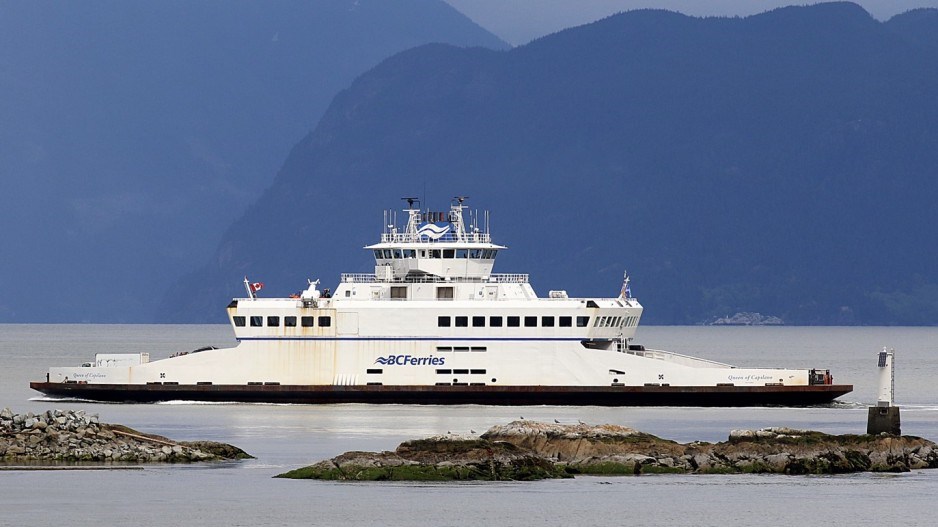If you were one of thousands of British Columbians who caught a ferry during the holiday season, you might have noticed new signs asking for your opinion on the future of the provincial ferry service.
The survey is part of CEO Nicolas Jimenez’s attempt to solve the mechanical breakdowns, staff shortages and ageing facilities that made 2023 one of the worst years in the history of BC Ferries.
But could even bigger reforms be on the table? Perhaps changes to the structure of the taxpayer-funded, quasi-private, ferry corporation itself?
Premier David Eby is leaving that door open, as he gives Jimenez, his hand-picked troubleshooter, the room to chart a course out of the mess entangling BC Ferries.
“If further structural reforms are needed, obviously, we would look at that,” Eby said in a recent year-end interview.
The hedged language puts large-scale changes to BC Ferries on the table, should Jimenez request them. It comes after a year of chaos in the system, in which massive service failures and staff shortages left passengers frustrated during the busiest travel times of the year.
“The structures are really challenging for government, and it makes it very hard to reach in and provide direction,” said Eby. “But, of course, it was designed for that reason.”
BC Ferries was made a private company by the BC Liberal government in 2003. The move was in response to the “fast ferry scandal” of the late 1990s, in which a $210 million plan by the then BC NDP government to build three new ships jumped to $450 million, only for the completed ships to be deemed unsuitable for local use and auctioned off for $19 million.
BC Ferries is now, on paper, a private company — albeit with a single shareholder (the provincial government) and annual public subsidies.
It also has a byzantine oversight system, in which it requires approval from two different boards of directors, an independent ferry commissioner and a provincial cabinet minister in order to make any major changes to sailings, fares or facilities.
Depending on your point of view, the corporate structure either protects BC Ferries from political interference, or hinders it from being flexible and responsive to a changing future.
“The structures are certainly an issue,” said Eby.
“But we're staying focused on how we can make a difference in terms of just delivering those sailings for people sitting on the tarmac waiting for their boat.”
The Eby government last year gave BC Ferries $500 million to prevent projected 10 per cent annual rate increases each of the next four years.
“What we've done is we've provided direct financial support to BC Ferries so that ferry fares remain more affordable for people,” said Eby.
Nonetheless, the corporation remains squeezed between an unchangeable sailing schedule, expensive fuel costs and a labour shortage caused partly by underpaid staff. Its fares largely fail to cover existing costs, let alone fund upgrades to vessels and terminals. It can’t increase rates without angering both the public and government.
The NDP has stopped short of returning BC Ferries into government, because doing so would mean absorbing hundreds of millions of dollars of (currently private) ferry debt back onto government books, where it would reduce the ability to borrow for new highways, hospitals and schools.
Plus, the Opposition BC United party is waiting in the wings to pounce on any suggestion the NDP is trying to retake direct control of the ferry system and spark another fast ferry fiasco.
“You have to remove the politicians, that's why we set it up to be independent of government,” said United Leader Kevin Falcon, who was in the BC Liberal cabinet at the time the company was privatized.
“But what the NDP have done is they've said no, we want to interfere. So they appointed Joy MacPhail, who's the architect of the fast ferries fiasco, as the chair of the board. They've hired a president that will do their bidding. And not surprisingly, the wheels have come right off.”
Falcon said an elected BC United government would further enshrine the independence of BC Ferries.
“You have a contract that says we expect you to hit these performance milestones and these key performance indicators based on this money we give you,” he said. “That's how it should be done.”
It’s not clear to anyone right now how to solve the many problems facing BC Ferries.
The previous system of direct political control may have produced lousy results, but you could argue that the current era of faux-independence isn’t much better, leaving a cash-strapped ferry corporation lurching from one failure to another in 2023.
Perhaps Jimenez can pinpoint a solution for the future of BC Ferries. If so, it would appear he’s got a lot of room from the Eby administration to test the waters with major reforms.
Rob Shaw has spent more than 15 years covering B.C. politics, now reporting for CHEK News and writing for Glacier Media. He is the co-author of the national bestselling book A Matter of Confidence, host of the weekly podcast Political Capital, and a regular guest on CBC Radio.




